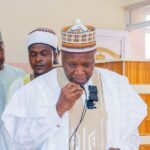The International Observatory for Peace, Democracy, and Human Rights (IOPDHR) at the 55th session of the Human Rights Council in Geneva has focused on the right to development and the challenges of security and stability in the countries of the Sahel and the Maghreb.
The meeting which provided an opportunity to underscore the complex challenges facing the region highlighted the promising initiatives for development and stability, particularly those of Morocco.
Aïcha DOUIHI, head of the International Human Rights Observatory in Geneva, has emphasizied the importance of placing the human being at the center of public policies.
“Ensuring a decent standard of living is fundamental to guaranteeing the right to development in these times marked by conflicts and a lack of dialogue”, she said, reminding that the protection of human rights is inseparable from sustainable development.
Also, El Habib BELKOUCH, president of the Center for Human Rights and Democracy Studies, provided an overview of the right to development in the Maghreb region, which has not yet reached the desired level by its peoples despite enormous economic potential and significant integration opportunities.
According to him, the region still lives in “catastrophic conditions that threaten to destroy societies”. The political changes brought about by the “Arab Spring” have not succeeded in improving the situation, rather transforming the conditions into “a nightmare that weighs on the political, economic, and social aspects of several countries in the Maghreb region”.
BELKOUCH, however, praised the Moroccan experience, which has managed to “achieve quantitative and qualitative accumulation while maintaining the system”, ensuring “necessary improvements, reconciling political opponents, and improving the situation of women and marginalized groups”. The efforts deployed by Morocco have enabled it to “guarantee the development of the economic and social fabric through accumulation”, although this should not overshadow persistent deficiencies, notably the weakness of the political actor and the difficulty of neighborly relations, referring to Algeria which sought to hinder integration by closing borders and halting the gas pipeline crossing the Kingdom to Spain.
Despite the challenges, BELKOUCH insists on the need to continue efforts for “democratic governance that gives hope to future generations”.
Souhail BELHADJ KLAZ emphasized the need to adopt a more strategic approach to combating instability in the Sahel. “It is crucial to address the root causes of instability by adopting democratic governance and enhancing international cooperation”, he explained, criticizing reactivity rather than proactivity of current strategies.
Awa N’DIAYE, President of Espace Afrique International, advocated for a South-South cooperation strategy. She expressed deep admiration for the development strategy adopted by Morocco, particularly regarding its support for African countries. She specifically highlighted the Trans-Saharan Gas Pipeline project, a flagship initiative of Morocco, as a shining example of South-South cooperation in action.
“This gas pipeline project, which aims to connect several African countries and facilitate access to energy while promoting regional economic integration, embodies the spirit of solidarity and mutually beneficial partnership”, she explained. According to N’DIAYE, this Moroccan initiative goes beyond the framework of economic development to touch on the very foundations of sustainable and inclusive development. She emphasized that “this project is a pillar for energy security, job creation, and improving living conditions across the continent”.
N’DIAYE also appreciated how Morocco has positioned South-South cooperation at the heart of its foreign policy, making African solidarity a major axis of its diplomatic action and economic development.
WATCH TOP VIDEOS FROM NIGERIAN TRIBUNE TV
- Relationship Hangout: Public vs Private Proposals – Which Truly Wins in Love?
- “No” Is a Complete Sentence: Why You Should Stop Feeling Guilty
- Relationship Hangout: Friendship Talk 2025 – How to Be a Good Friend & Big Questions on Friendship
- Police Overpower Armed Robbers in Ibadan After Fierce Struggle





